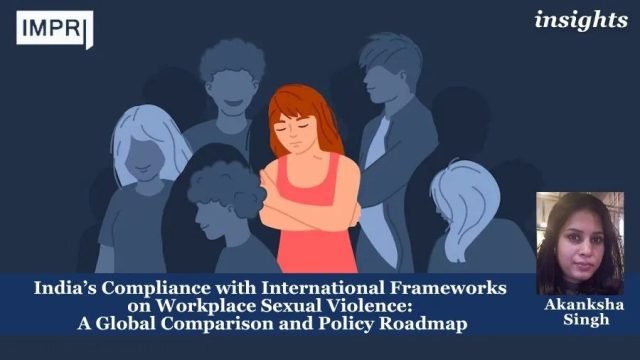Akanksha Singh
Workplace sexual violence remains a major global issue, impacting women’s safety, dignity, and economic participation. Studies indicate that 1 in 3 women worldwide face workplace harassment (ILO, 2022). According to data from the National Crime Records Bureau (NCRB), in 2022, India has over 419 reported cases, equating to about 35 incidents per month. International frameworks like ILO Convention 190 (2019), CEDAW (1979), and the Beijing Platform for Action (1995) set global standards for addressing this issue.
India’s Sexual Harassment of Women at Workplace (Prevention, Prohibition, and Redressal) Act, 2013 (POSH Act) aligns with these frameworks but suffers from weak enforcement and accountability. In contrast, Global North countries—such as the U.S., Canada, Australia, and EU nations—demonstrate stronger compliance through stricter employer accountability, survivor-centric redressal, and broader legal coverage.
This article examines India’s compliance with international frameworks, compares it with best
practices from the Global North, and proposes policy recommendations to close existing gaps.
India’s Compliance with International Frameworks
1) ILO Convention 190 (2019) – A Missed Opportunity
ILO C190 is the first legally binding international treaty addressing violence and harassment in the workplace. It mandates:
• A broad definition of workplace harassment, including cyber and third-party harassment.
• Employer responsibility for preventive measures.
• Strong enforcement mechanisms for redressal.
India has not ratified ILO C190, leaving gig, domestic, and informal workers unprotected. In contrast, Argentina, Uruguay, and South Africa have ratified it and strengthened employer mandates accordingly.
2) CEDAW (1979) – Gaps in Implementation
India ratified CEDAW in 1993, committing to eliminate gender-based workplace discrimination. However, the CEDAW Committee (2014) criticized:
• Lack of awareness and training among employers.
• Ineffectiveness of Internal Committees (ICs).
• Low reporting rates due to retaliation fears.
Countries like Sweden and Canada ensure stronger CEDAW compliance through independent
oversight bodies, which India lacks.
3) Beijing Platform for Action (1995) – Inconsistent Compliance
This framework advocates for preventive measures, effective redressal, and legal protections
against workplace harassment. Studies show only 30% of companies comply with POSH
mandates (NASSCOM, 2022).
Comparison with the Global North: Best Practices
Despite the POSH Act’s significance, India lags in implementation, enforcement, and inclusivity. Global North countries have adopted stronger legal protections, employer accountability, and survivor-centric mechanisms.
1) Expanding Legal Coverage & ILO C190 Compliance
The POSH Act excludes gig, informal, and domestic workers.
Best Practices:
• ILO C190 Ratification (Canada, France, Germany, Australia) – Extends protections to all workers.
• EU Directive 2006/54/EC – Covers freelancers and contract workers.
• U.S. Fair Labor Standards Act & EEOC Regulations – Includes gig economy workers.
2) Strengthening Employer Accountability
Many Indian companies fail to establish ICCs, and non-compliance penalties are weak.
Best Practices:
• U.S. (Title VII, EEOC) – Employers face direct liability and financial penalties.
• Australia (Respect@Work, 2020) – Shifts the burden of prevention to employers.
• France & Germany – Mandate risk assessments for harassment.
3) Survivor-Centric Redressal & Fast-Track Resolution
Survivors in India face retaliation, bias, and slow complaint resolution. A 2021 Women’s Indian Chamber of Commerce and Industry (WICCI) study found that 68% of women facing workplace misconduct didn’t report it due to fear of job loss, backlash, and stigma.
Best Practices:
• Canada (Workplace Harassment Regulations, 2020) – Ensures anonymous reporting and strict resolution timelines.
• UK & Australia – Allow independent investigations and legal aid for survivors.
• U.S. (EEOC) – Survivors can bypass internal complaint systems.

4) Criminal & Financial Penalties for Non-Compliance
The POSH Act lacks strict financial penalties, allowing workplaces to ignore compliance.
Best Practices:
• U.S. (EEOC) – Issues multi-million-dollar fines for systemic harassment.
• EU – Non-compliant employers face financial penalties and contract bans.
• Australia (Fair Work Commission) – Negligent firms lose government contracts.
5) Recognizing Domestic Violence as a Workplace Issue
ILO C190 recognizes that domestic violence affects workplace safety. India does not address
this issue.
Best Practices:
• New Zealand (Domestic Violence—Victims’ Protection Act, 2018) – Provides paid leave, flexible work, and workplace safety plans.
• Canada & Australia – Employers must offer support systems for survivors. Mandatory Workplace Training & Awareness
6) Lack of awareness weakens India’s enforcement.
Best Practices:
• U.S. (California & New York laws) – Require annual anti-harassment training.
• EU – Mandates regular training with penalties for non-compliance.
7) LGBTQ+ & Intersectional Protections
The POSH Act does not explicitly protect LGBTQ+ individuals or caste-based harassment
victims.
Best Practices:
• Canada & EU – Recognize gender identity and sexual orientation in workplace harassment
laws.
• U.S. (Bostock v. Clayton County, 2020) – Supreme Court ruling expanded LGBTQ+ workplace protections.
Case Study: Workplace Sexual Harassment – India vs. U.S.
- India: 2023 Indian Wrestlers’ Protest
Top female wrestlers accused WFI President Brij Bhushan Singh of sexual harassment spanning over a decade. Despite Supreme Court intervention, legal action remains delayed (as of 2025). - U.S.: Gretchen Carlson vs. Roger Ailes (2016)
Fox News anchor filed a lawsuit against CEO Roger Ailes. The case prompted immediate investigations, leading to Ailes’ resignation within weeks. Fox settled for $20 million and publicly apologized. - Key Differences:
Timeliness: U.S. cases are resolved within months, while Indian cases drag on for years.
Accountability: U.S. offenders face immediate consequences, while Indian accused often retain power.
Legal Action: The U.S. legal system ensures swift penalties, whereas Indian survivors face systemic delays.
Policy Recommendations for India
- Expand Legal Coverage
Ratify ILO C190 to include gig, domestic, and informal workers.
Amend POSH Act to cover all workplaces, regardless of employee count. - Strengthen Employer Accountability
Enforce strict penalties for ICC non-compliance.
Mandate regular audits and public reporting. - Survivor-Centric Redressal
Establish anonymous reporting mechanisms.
Create an independent national oversight body for workplace harassment cases. - Imposing Financial & Criminal Penalties
Fine non-compliant companies (₹10 lakh – ₹1 crore).
Introduce criminal liability for severe harassment cases. - Recognizing Domestic Violence at Work
Provide paid leave and workplace safety measures for survivors. - Mandatory Training & Awareness
Annual anti-harassment training for all employees.
Specialized ICC and HR training. - LGBTQ+ & Caste-Based Protections
Amend POSH Act to include LGBTQ+ and caste-based harassment.
India’s POSH Act (2013) is a critical step in addressing workplace sexual harassment, but weak
enforcement, employer non-compliance, and lack of independent oversight limit its impact. In
contrast, Global North nations enforce strict employer liability, independent investigations,
financial penalties, and survivor-centric policies—best practices India must adopt. To ensure safe and inclusive workplaces, India must ratify ILO C190, expand protections to gig and informal workers, strengthen penalties, and mandate employer accountability. A survivor focused, globally aligned approach will transform policies into real workplace safety.
About the contributor: Dr Bijayalaxmi Panda is a fellow at YWLPPF 2.0 Young Women Leaders in Public Policy Fellowship 2.0 at IMPRI.
Disclaimer: All views expressed in the article belong solely to the author and not necessarily to the organisation.
Read more at IMPRI:
Weakened Sexual Assault Verdicts Undermine Both Gender Justice and Economic Progress
Judicial corruption and case backlog: An exception or an endemic?
Acknowledgment: This article was posted by Bhaktiba Jadeja, visiting researcher and assistant editor at IMPRI.



















